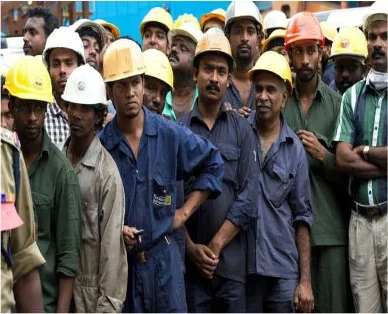
Joseph Antony Kujur, BPCL
josephakujur001@bharatpetroleum.in

Section 46 of the Factories Act, 1948 provides that the State Government may make rules requiring that in any specified factory wherein more than 250 workers are ordinarily employed, a canteen or canteens shall be provided and maintained by the Occupier for the use of the workers.
Thus, it follows from the definition itself that the employer has a statutory obligation for providing and maintaining canteen or canteens in accordance with the prescribed rules. The Act is silent on how it is to be provided and maintained. By implication it would mean that the employer is free to run the canteen either departmentally or outsource it to an external agency/contractor. But carrying out a statutory obligation through a contractor has its inherent risks. Such risks have been addressed, analysed and settled by various court judgements, over a period of about two decades.
The question of running a statutory canteen through a contractor has always been a concern expressed by various HR professionals and has been the subject matter of many Court rulings.
I would therefore like to discuss in some detail the judgements which have been the guiding principle on this subject.
In Parimal Chandra Raha Vs LIC of India (1995), the Hon’ble Supreme Court held that the employees of Canteens of LIC although non-statutory, and run and managed by contractors, are the employees of the Corporation and are entitled to relief of absorption by the corporation as its regular employees.
The Courts however changed their stand in their succeeding judgements. In RBI Vs Workmen, 1996, a three-judge bench of the Supreme Court held that a workman of a statutory canteen would be a workman of the establishment for the purpose of Factories Act only and not for other purposes. The status of a workman under the Factories Act confines the relationship of employer and the employees to the requirement of the Factories Act and does not extend for any other purpose which include continuity of service, seniority, pension and other benefits which a regular employee enjoys. The Factories Act does not govern the rights of employees with reference to recruitment, seniority, promotion, retirement benefit, etc. These are governed by other statutes, rules, contracts or policies. Therefore, the workmen’s contention that the employees of a statutory canteen ipso facto become the employee of the establishment for all purposes cannot be accepted.
The Hon’ble Supreme Court once again in Indian Petro Chemical Corporation Vs. Shramik Sena & Ors, 1999 held that the workmen working in the canteen becomes the worker of the establishment for the purposes of Factories Act only and not for any other purposes. They do not become the employees of the management for any other purposes entitling them for absorption into the service of the principal employer. The management does exercise effective control over the contractor on certain matters in regard to the running of the canteen but such control is being exercised to ensure that the canteen is run in an effective manner and to provide wholesome and healthy food to the workmen of the establishment. The following points are thereby kept in mind.
- A freehand has been given to the contractor with regard to the engagement of the employees working in the canteen.
- No power vests in the management to make the appointment.
- No power vests in the management to take disciplinary action against the erring workmen and their dismissal or removal from service.
On the basis of the above, it cannot be said that the contractor was an agent or manager of the establishment working completely under the supervision and control of the management and the employees working under him have become the employees of the management.
In the case of Haldia Refinery Canteen Employees Union & Ors. Vs M/s. Indian Oil Corpn. Ltd.(2005), the Supreme Court has reiterated the view of the judgments passed in Reserve Bank of India and Indian Petro Chemicals Corporation. This judgement has very clearly stated the area of control to be exercised by the contractor and the extent of control to be kept by the management to keep a check over the quality of service provided to its employees. This judgement could be a guideline while outsourcing the statutory obligation of running canteens u/s 46 of the Factories Act, 1948.
Thus the apex court has established that the employees and workmen employed in statutory canteen should be workmen only for the Factories Act and not for all other purposes even if they are engaged by the contractors. The contention that the employees of a statutory canteen ipso facto become the employees of the establishment for all purposes cannot be accepted.
In another judgement namely, the General Manager Vs Canteen Workers of BHEL, 2010, the Supreme Court has stated that where BHEL was providing canteen to its employees in accordance with Section 46 of the Factories Act, the canteen was originally managed by an independent contractor and subsequently it was managed by a society formed by the workmen of the contractor. It cannot be said that the workers of the canteen are in effect the workers of the company. The accounts of the Society clearly shows that it was having a budget and provisions were made for payment of salary and dividend to its members. Therefore, the society was managing its affairs independently without the control of BHEL. The Court further held that the obligation to provide a canteen has to be distinguished from the obligation to provide facilities to run the canteen. The canteen that runs pursuant to the obligation does not become a part of the establishment.
From the foregoing judgements of Apex Court, we find that the judicial interpretation has undergone a major shift in their approach to running of statutory canteens through contractors and the present trend of judgements does not cast an obligation upon the principal employer to absorb the employees of the contractor.
Therefore, summing up, the take away from the judgements above can be stated as below:
- There is no such absolute proposition in law that the employer has to engage his own employees for running the canteen activities.
- It is the discretion of the employer on how to discharge his statutory obligation of providing and maintaining a canteen for his employees.
- The engagement of contract labour does not establish an employer-employee relationship automatically under Section 46 of the Factories Act.
- If the contract is a ‘sham’ one (not genuine), i.e. when the administration, supervision, disbursement of wages, attendance, sanctioning of leave, etc. for the contract labour are directly done by the principal employer, it may amount to unfair labour practice by the principal employer and in that event, the demand for absorption may be sustainable.
- However, the Supreme Court has held that even in such cases, the contract labours are to be treated as employees of the establishment only for the purpose of the Factories Act. In other words, they are to be governed under the provisions of the Factories Act as stated for other employees like health, safety, welfare, hours of work, engagement of female employees, etc.
In view of this position of law, being sufficiently clear, outsourcing of canteen activities does not appear to be posing issues subject to the guidelines, which have been stated in the above mentioned Supreme Court’s judgments.
Posted in Employee Relations | No Comments »
Recent Articles
- The Labour Codes and the Indian oil Industry: The Act, The Fact and the Impact
- Grievance Redressal Mechanism
- HR at New Normal Work Stations
- Talent woes down south-A wake up call
- Can the activities of a statutory canteen be outsourced in a factory under the factories ACT’ 1948?
- A “Workman” under the Industrial Disputes Act, 1947
- Fixed Term Employment: Whether to bite the bullet
- Where there is a ‘‘WILL’’…..It shows a way
- Moonlighting in Employment
- Story on Employee Relations
- Employees Pension scheme, 1995- A saga of Litigation
